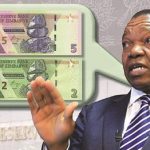HON. MURIRE: My question is directed to the Minister of Industry and Commerce. Before asking my question, I want to thank the Minister of Finance and the Governor of the Reserve Bank for having stabilised the exchange rate market. However, my question is premised on the fact that whilst the formal exchange rate has stabilised, the black market rate is actually going up and determining the prices that we are buying goods at in shops and wholesales. What is the Ministry’s policy on stabilising the prices that are being pegged using the black market rate? It is so apparent that even in the hotels where we are staying, prices are pegged using the black market rate. What mechanism is the Ministry putting in place to ensure that we achieve the programme that has already been set by the Reserve Bank and the Ministry of Finance?
THE DEPUTY MINISTER OF FINANCE AND ECONOMIC DEVELOPMENT (HON CHIDUWA): As has been identified by the Hon. Member, what we have seen with quite a number of pricing models that are used by supermarkets and wholesalers is that the prices are linked to the parallel market rates and in terms of the position of Government having noticed what was happening – this is why we came up with S.I. 127. Statutory Instrument 127 is very explicit that we should make use of the obtaining interbank rate or auction rate. The challenge that we are having is that of compliance. In terms of the position of Government, it is very clear that we should make use of the auction rate.
The other issue that we can consider in terms of stabilising our currency is the issue of production. As long as we are producing, doing value addition and exporting, the foreign receipts that we will get are what will stabilise our currency. The issue is on production, where we are going to earn more foreign currency thereby stabilising our currency and then this is going to filter into the pricing models of service providers.
HON. MURIRE: The Minister has actually addressed my question from the Ministry of Finance and Reserve Bank. Yes, they have stabilised and what is left is to produce. My question is based on the compliance aspect that he has mentioned. There is deviant behaviour in the market. My supplementary question is what mechanisms are you putting in place to ensure compliance in a situation where we have got shortage of that foreign currency and not producing enough? I thank you.
HON. CHIDUWA: I will go back to the provisions of S.I. 127 for the violations as stated – where we said retailers are not displaying prices, retailers and service providers are not showing dual pricing in both United States dollars and local currency and not banking daily proceeds. The penalties are there. So in terms of enforcing compliance, we have got a list of penalties and I have presented a Ministerial Statement here where we mentioned all the penalties that are specific for each violation. So I would say again, together with the Consumer Protection Commission and the police, they are on the ground and I can give you some statistics.
The last time I got some statistics from the Financial Intelligence Unit, I think around 27 violators had been given tickets and penalties. So we are on the ground, the Financial Intelligence Unit is on the ground, the Consumer Protection Commission is on the ground and we are enforcing those penalties. Thank you.
Continued next page
(262 VIEWS)



Pingback: Zimbabwe inflation drops by only 6 percentage points | The Insider